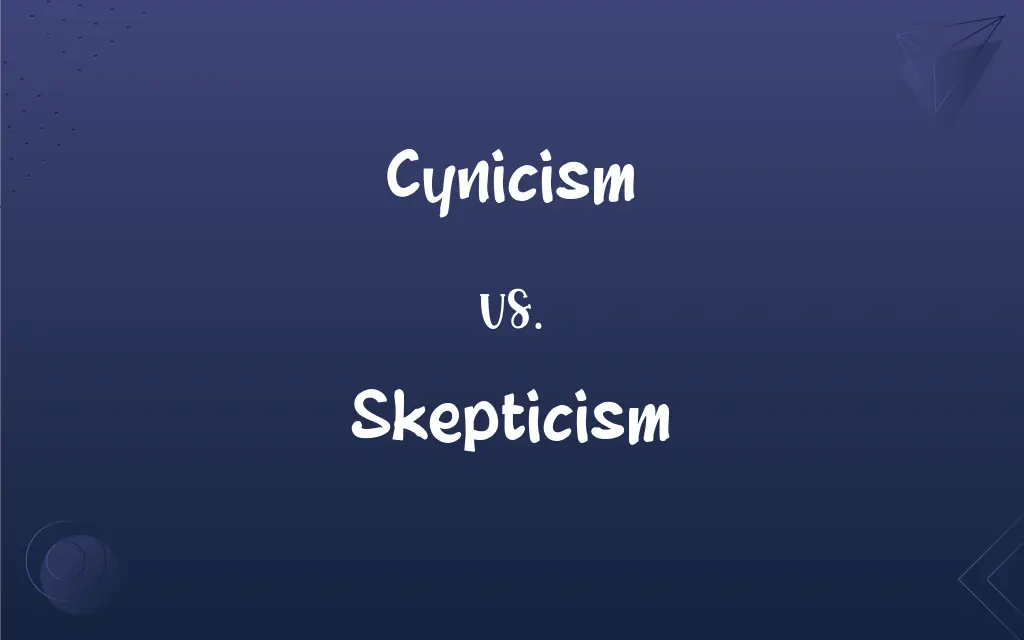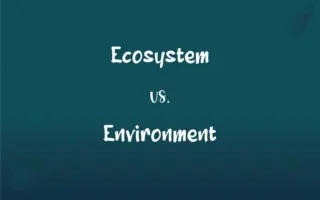Cynicism vs. Skepticism: What's the Difference?
Edited by Harlon Moss || By Janet White || Published on October 17, 2023
Cynicism is the general distrust of others' motives, often assuming self-interest or deceit. Skepticism is the doubt or questioning of accepted beliefs or claims, often requiring evidence for validation.

Key Differences
Cynicism refers to a mindset characterized by a general distrust of others' intentions and motives, often coupled with the belief that people are primarily driven by self-interest rather than sincerity or altruism. Skepticism, in contrast, pertains to the intellectual disposition of questioning or doubting established beliefs, opinions, or claims. Both cynicism and skepticism involve a form of doubt, but they apply this doubt in different domains and for different reasons.
Grammatically, both "cynicism" and "skepticism" function as nouns in American English. Cynicism is generally an uncountable noun that refers to an attitude or state of mind. Skepticism is also typically an uncountable noun but can sometimes be countable when referring to specific instances or types of skepticism ("skepticisms").
Cynicism often manifests as a pessimistic outlook that questions the sincerity or goodness in others. It is generally broad and may not require evidence for its assertions. Skepticism, however, is more specific and often seeks empirical evidence or logical reasoning to support or refute a claim. Skeptics may doubt claims due to lack of evidence but are generally open to changing their view when provided with credible evidence.
Cynicism can sometimes be seen as a defensive mechanism to protect oneself from being cheated or deceived. Skepticism, on the other hand, is often considered a rational and open-minded inquiry that serves as a tool for scientific investigation, philosophical discourse, or critical thinking. While cynicism may close off dialogue by assuming the worst, skepticism can pave the way for constructive discussion by fostering a culture of inquiry and evidence-based reasoning.
Comparison Chart
Definition
Distrust of others' motives
Questioning of accepted beliefs
ADVERTISEMENT
Grammatical Role
Uncountable noun
Uncountable, sometimes countable noun
Focus
People's intentions and motives
Beliefs, claims, evidence
Outlook
Pessimistic
Neutral or open-minded
Proof Requirement
Not necessary
Often required
Cynicism and Skepticism Definitions
Cynicism
Defensive attitude against deceit.
His cynicism is a shield against being fooled.
ADVERTISEMENT
Skepticism
Method of questioning everything.
Skepticism leads her to ask important questions.
Cynicism
Distrust of others' intentions.
His cynicism about politicians knows no bounds.
Skepticism
Doubt of accepted beliefs or claims.
His skepticism about UFOs made him a critical thinker.
Cynicism
Belief in human selfishness.
Her cynicism prevented her from seeing the good in people.
Skepticism
Requirement for evidence to support belief.
Her skepticism keeps her from falling for scams.
Cynicism
Pessimistic outlook on life.
Cynicism keeps him from enjoying many things.
Skepticism
Intellectual caution.
Skepticism is a tool for scientific inquiry.
Cynicism
General disbelief in altruism.
Her cynicism made her question every good deed she saw.
Skepticism
Disbelief in specific concepts.
His skepticism of astrology is based on its lack of scientific backing.
Cynicism
An attitude of scornful or jaded negativity, especially a general distrust of the integrity or professed motives of others
The public cynicism aroused by governmental scandals.
Skepticism
A doubting or questioning attitude or state of mind; dubiety.
Cynicism
A scornfully or jadedly negative comment or act
"She arrived at a philosophy of her own, all made up of her private notations and cynicisms" (Henry James).
Skepticism
The ancient school of Pyrrho of Elis that stressed the uncertainty of our beliefs in order to oppose dogmatism.
Cynicism
Cynicism The beliefs of the ancient Cynics.
Skepticism
The doctrine that absolute knowledge is impossible, either in a particular domain or in general.
Cynicism
(uncountable) A distrustful attitude.
Skepticism
A methodology based on an assumption of doubt with the aim of acquiring approximate or relative certainty.
Cynicism
(uncountable) An emotion of jaded negativity, or a general distrust of the integrity or professed motives of other people. Cynicism can manifest itself by frustration, disillusionment and distrust in regard to organizations, authorities and other aspects of society, often due to previous bad experience. Cynics often view others as motivated solely by disguised self-interest.
Skepticism
Doubt or disbelief of religious tenets.
Cynicism
(countable) A skeptical, scornful or pessimistic comment or act.
Skepticism
The practice or philosophy of being a skeptic.
Cynicism
The doctrine of the Cynics; the quality of being cynical; the mental state, opinions, or conduct, of a cynic; morose and contemptuous views and opinions.
Skepticism
A studied attitude of questioning and doubt
Cynicism
A cynical feeling of distrust
Skepticism
The doctrine that absolute knowledge is not possible
Skepticism
A methodology that starts from a neutral standpoint and aims to acquire certainty though scientific or logical observation.
Skepticism
Doubt or disbelief of religious doctrines
Skepticism
An undecided, inquiring state of mind; doubt; uncertainty.
That momentary amazement, and irresolution, and confusion, which is the result of skepticism.
Skepticism
The doctrine that no fact or principle can be certainly known; the tenet that all knowledge is uncertain; Pyrrohonism; universal doubt; the position that no fact or truth, however worthy of confidence, can be established on philosophical grounds; critical investigation or inquiry, as opposed to the positive assumption or assertion of certain principles.
Skepticism
A doubting of the truth of revelation, or a denial of the divine origin of the Christian religion, or of the being, perfections, or truth of God.
Let no . . . secret skepticism lead any one to doubt whether this blessed prospect will be realized.
Skepticism
Doubt about the truth of something
Skepticism
The disbelief in any claims of ultimate knowledge
FAQs
Is Skepticism a noun?
Yes, "skepticism" is mainly an uncountable noun but can sometimes be countable.
How do Cynicism and Skepticism differ?
Cynicism involves distrust of motives, while skepticism focuses on doubting claims and requiring evidence.
Is Cynicism pessimistic?
Cynicism generally has a pessimistic outlook.
What does Skepticism focus on?
Skepticism focuses on questioning accepted beliefs and claims.
What is Cynicism?
Cynicism is a general distrust of others' motives.
Does Skepticism require evidence?
Yes, skepticism often seeks evidence or logical reasoning.
What is Skepticism?
Skepticism is the questioning of accepted beliefs or claims.
Is Cynicism a noun?
Yes, "cynicism" is generally an uncountable noun in American English.
Does Cynicism require evidence?
No, cynicism often doesn't require evidence and is based on general distrust.
Is Cynicism always negative?
Cynicism is generally viewed as a negative or pessimistic attitude.
Can Cynicism be protective?
Yes, cynicism can serve as a defense against deceit.
What does Cynicism focus on?
Cynicism primarily focuses on distrust of people's motives and intentions.
Is Skepticism pessimistic?
Skepticism is usually neutral and focuses on evidence-based reasoning.
Is Skepticism open-minded?
Skepticism is often considered open-minded and evidence-focused.
Is Skepticism scientific?
Skepticism is often applied in scientific and philosophical contexts as a tool for critical thinking.
About Author
Written by
Janet WhiteJanet White has been an esteemed writer and blogger for Difference Wiki. Holding a Master's degree in Science and Medical Journalism from the prestigious Boston University, she has consistently demonstrated her expertise and passion for her field. When she's not immersed in her work, Janet relishes her time exercising, delving into a good book, and cherishing moments with friends and family.
Edited by
Harlon MossHarlon is a seasoned quality moderator and accomplished content writer for Difference Wiki. An alumnus of the prestigious University of California, he earned his degree in Computer Science. Leveraging his academic background, Harlon brings a meticulous and informed perspective to his work, ensuring content accuracy and excellence.







































































